英语语法大攻克--被动语态及定语从句过关
- 格式:doc
- 大小:63.50 KB
- 文档页数:8

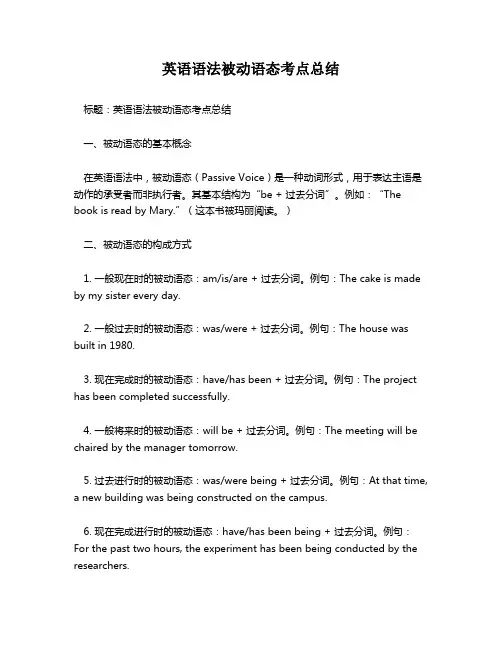
英语语法被动语态考点总结标题:英语语法被动语态考点总结一、被动语态的基本概念在英语语法中,被动语态(Passive Voice)是一种动词形式,用于表达主语是动作的承受者而非执行者。
其基本结构为“be + 过去分词”。
例如:“The book is read by Mary.”(这本书被玛丽阅读。
)二、被动语态的构成方式1. 一般现在时的被动语态:am/is/are + 过去分词。
例句:The cake is made by my sister every day.2. 一般过去时的被动语态:was/were + 过去分词。
例句:The house was built in 1980.3. 现在完成时的被动语态:have/has been + 过去分词。
例句:The project has been completed successfully.4. 一般将来时的被动语态:will be + 过去分词。
例句:The meeting will be chaired by the manager tomorrow.5. 过去进行时的被动语态:was/were being + 过去分词。
例句:At that time,a new building was being constructed on the campus.6. 现在完成进行时的被动语态:have/has been being + 过去分词。
例句:For the past two hours, the experiment has been being conducted by the researchers.三、被动语态的应用场景1. 不知道或无需提及动作的执行者时。
2. 强调动作的承受者或者结果时。
3. 在科技论文、新闻报道、官方文件等正式文体中常使用被动语态以保持客观公正。
四、被动语态的转换与注意事项主动语态可以转换为被动语态,反之亦然。




初中英语语法——被动语态用法总结归纳被动语态是英语语法中的一种重要的句型结构,用来表示主语是动作的承受者,或者是主语被动地接受了其中一种行为或影响。
在被动语态中,动作的执行者通常不被说明,而动作的接受者(主语)成为句子的重点。
被动语态的结构是:“be”动词的适当形式 + 过去分词被动语态的时态、语态和主动语态一样,即可以变换时态(一般现在时、一般过去时、一般将来时等)和语态(进行时、完成时等)。
下面对被动语态的几个方面进行总结归纳。
1.一般现在时被动语态:一般现在时被动语态的结构是:“am/is/are”(be动词的适当形式)+ 过去分词例如:- 主动语态:They make cars.- 被动语态:Cars are made by them.2.一般过去时被动语态:一般过去时被动语态的结构是:“was/were”(be动词的适当形式)+ 过去分词例如:- 主动语态:She cooked dinner.- 被动语态:Dinner was cooked by her.3.一般将来时被动语态:一般将来时被动语态的结构是:“will be”(be动词的适当形式)+ 过去分词例如:- 主动语态:You will clean the room.- 被动语态:The room will be cleaned by you.4.进行时被动语态:进行时被动语态的结构是:“am/is/are being”(be动词的适当形式)+ 过去分词例如:- 主动语态:They are painting the wall.- 被动语态:The wall is being painted by them.5.完成时被动语态:完成时被动语态的结构是:“has/have been”(be动词的适当形式)+ 过去分词例如:- 主动语态:She has written a book.- 被动语态:A book has been written by her.需要注意的是,被动语态的主语通常不是动作的执行者,所以经常用于下面几种情况:-当动作的执行者不得而知或不重要时,使用被动语态。
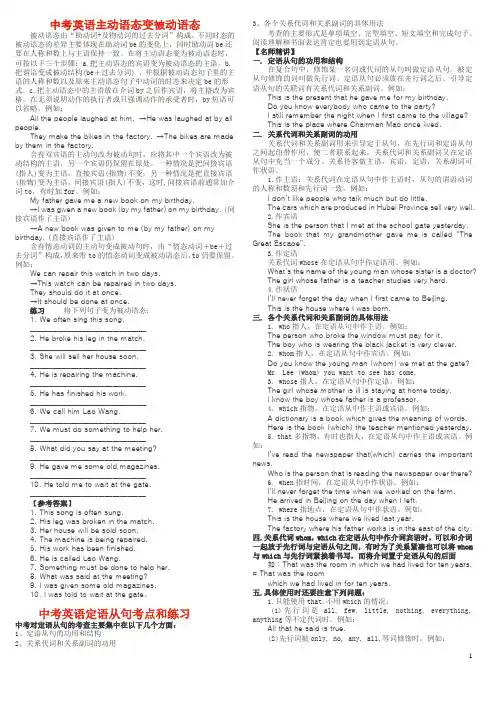
中考英语主动语态变被动语态被动语态由“助动词+及物动词的过去分词”构成。
不同时态的被动语态的差异主要体现在助动词be的变化上,同时助动词be还要在人称和数上与主语保持一致。
在将主动语态变为被动语态时,可按以下三个步骤:a.把主动语态的宾语变为被动语态的主语。
b.把谓语变成被动结构(be+过去分词) ,并根据被动语态句子里的主语的人称和数以及原来主动语态句子中动词的时态来决定be的形式。
c.把主动语态中的主语放在介词by之后作宾语,将主格改为宾格。
在无须说明动作的执行者或只强调动作的承受者时,by短语可以省略。
例如:All the people laughed at him. →He was laughed at by all people.They make the bikes in the factory. →The bikes are made by them in the factory.含有双宾语的主动句改为被动句时,应将其中一个宾语改为被动结构的主语,另一个宾语仍保留在原处。
一种情况是把间接宾语(指人)变为主语,直接宾语(指物)不变;另一种情况是把直接宾语(指物)变为主语,间接宾语(指人)不变,这时,间接宾语前通常加介词to,有时加for。
例如:My father gave me a new book on my birthday.→I was given a new book (by my father) on my birthday. (间接宾语作了主语)→A new book was given to me (by my father) on my birthday. (直接宾语作了主语)含有情态动词的主动句变成被动句时,由“情态动词+be+过去分词”构成,原来带to的情态动词变成被动语态后,to仍要保留。
例如:We can repair this watch in two days.→This watch can be repaired in two days.They should do it at once.→It should be done at once.练习将下列句子变为被动语态:1. We often sing this song._______________________________2. He broke his leg in the match._______________________________3. She will sell her house soon._______________________________4. He is repairing the machine._______________________________5. He has finished his work._______________________________6. We call him Lao Wang._______________________________7. We must do something to help her._______________________________8. What did you say at the meeting?_______________________________9. He gave me some old magazines._______________________________10. He told me to wait at the gate._______________________________【参考答案】1. This song is often sung.2. His leg was broken in the match.3. Her house will be sold soon.4. The machine is being repaired.5. His work has been finished.6. He is called Lao Wang.7. Something must be done to help her.8. What was said at the meeting?9. I was given some old magazines.10. I was told to wait at the gate。
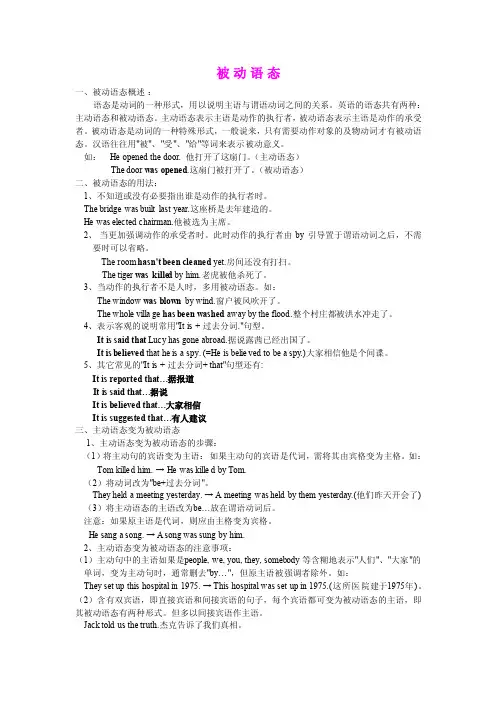
被动语态一、被动语态概述:语态是动词的一种形式,用以说明主语与谓语动词之间的关系。
英语的语态共有两种:主动语态和被动语态。
主动语态表示主语是动作的执行者,被动语态表示主语是动作的承受者。
被动语态是动词的一种特殊形式,一般说来,只有需要动作对象的及物动词才有被动语态。
汉语往往用"被"、"受"、"给"等词来表示被动意义。
如:He opened the door. 他打开了这扇门。
(主动语态)The door was opened.这扇门被打开了。
(被动语态)二、被动语态的用法:1、不知道或没有必要指出谁是动作的执行者时。
The bridge was builtlast year.这座桥是去年建造的。
He was electe d chairm an.他被选为主席。
2、当更加强调动作的承受者时。
此时动作的执行者由by引导置于谓语动词之后,不需要时可以省略。
The room hasn't been cleane d yet.房间还没有打扫。
The tigerwas killed by him.老虎被他杀死了。
3、当动作的执行者不是人时,多用被动语态。
如:The window was blownby wind.窗户被风吹开了。
The wholevillag e has been washed away by the flood.整个村庄都被洪水冲走了。
4、表示客观的说明常用"It is + 过去分词."句型。
It is said that Lucy has gone abroad.据说露茜已经出国了。
It is believ ed that he is a spy. (=He is believ ed to be a spy.)大家相信他是个间谍。
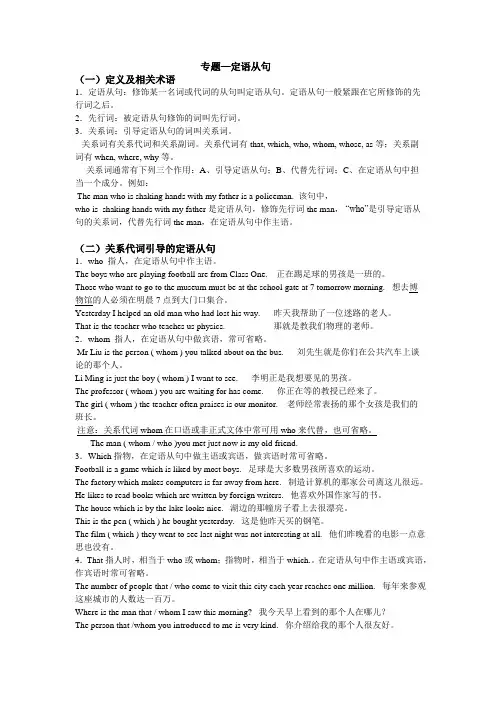
专题—定语从句(一)定义及相关术语1.定语从句:修饰某一名词或代词的从句叫定语从句。
定语从句一般紧跟在它所修饰的先行词之后。
2.先行词:被定语从句修饰的词叫先行词。
3.关系词:引导定语从句的词叫关系词。
关系词有关系代词和关系副词。
关系代词有that, which, who, whom, whose, as等;关系副词有when, where, why等。
关系词通常有下列三个作用:A、引导定语从句;B、代替先行词;C、在定语从句中担当一个成分。
例如:The man who is shaking hands with my father is a policeman. 该句中,who is shaking hands with my father 是定语从句,修饰先行词the man,“who”是引导定语从句的关系词,代替先行词the man,在定语从句中作主语。
(二)关系代词引导的定语从句1.who 指人,在定语从句中作主语。
The boys who are playing football are from Class One. 正在踢足球的男孩是一班的。
Those who want to go to the museum must be at the school gate at 7 tomorrow morning. 想去博物馆的人必须在明晨7点到大门口集合。
Yesterday I helped an old man who had lost his way. 昨天我帮助了一位迷路的老人。
That is the teacher who teaches us physics. 那就是教我们物理的老师。
2.whom 指人,在定语从句中做宾语,常可省略。
Mr Liu is the person ( whom ) you talked about on the bus. 刘先生就是你们在公共汽车上谈论的那个人。
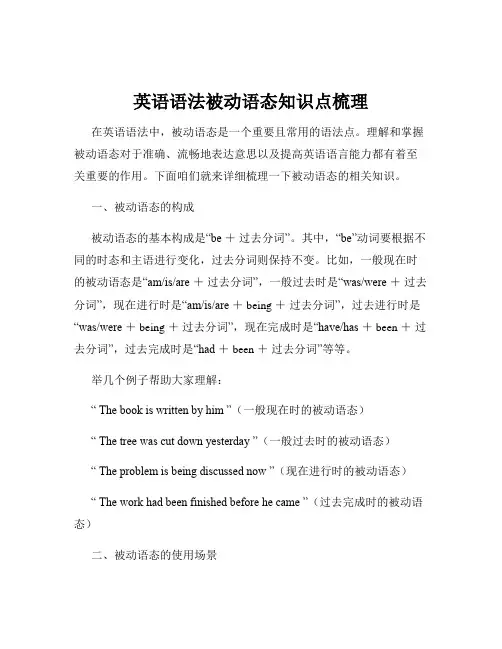
英语语法被动语态知识点梳理在英语语法中,被动语态是一个重要且常用的语法点。
理解和掌握被动语态对于准确、流畅地表达意思以及提高英语语言能力都有着至关重要的作用。
下面咱们就来详细梳理一下被动语态的相关知识。
一、被动语态的构成被动语态的基本构成是“be +过去分词”。
其中,“be”动词要根据不同的时态和主语进行变化,过去分词则保持不变。
比如,一般现在时的被动语态是“am/is/are +过去分词”,一般过去时是“was/were +过去分词”,现在进行时是“am/is/are + being +过去分词”,过去进行时是“was/were + being +过去分词”,现在完成时是“have/has + been +过去分词”,过去完成时是“had + been +过去分词”等等。
举几个例子帮助大家理解:“ The book is written by him ”(一般现在时的被动语态)“ The tree was cut down yesterday ”(一般过去时的被动语态)“ The problem is being discussed now ”(现在进行时的被动语态)“ The work had been finished before he came ”(过去完成时的被动语态)二、被动语态的使用场景1、不知道或没必要指出动作的执行者当我们关注的是动作本身而不是执行者时,就会使用被动语态。
例如:“The window was broken ”(不知道是谁打破了窗户)2、强调动作的承受者为了突出动作的承受者,会使用被动语态。
比如:“This song is loved by many people ”(强调很多人喜欢这首歌,而不是强调谁让很多人喜欢这首歌)3、出于礼貌或委婉在某些情况下,使用被动语态可以使表达更委婉、更礼貌。
比如:“It is suggested that you should come earlier ”(用被动语态比直接说“ We suggest that you should come earlier ”更委婉)三、主动语态变被动语态的方法1、把主动语态中的宾语变成被动语态的主语。
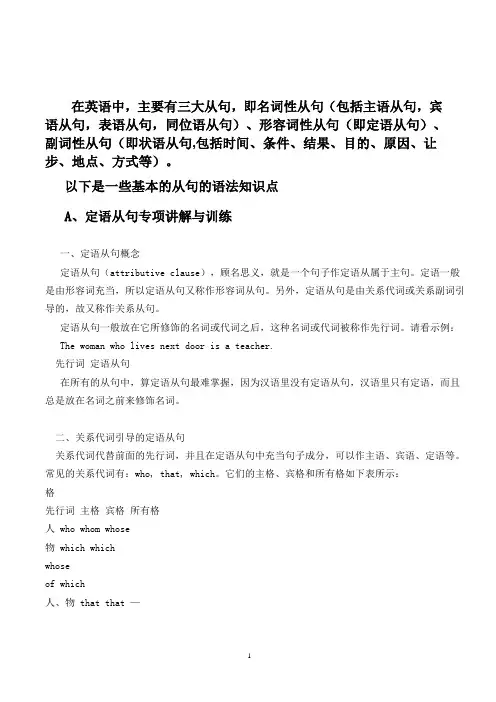
在英语中,主要有三大从句,即名词性从句(包括主语从句,宾语从句,表语从句,同位语从句)、形容词性从句(即定语从句)、副词性从句(即状语从句,包括时间、条件、结果、目的、原因、让步、地点、方式等)。
以下是一些基本的从句的语法知识点A、定语从句专项讲解与训练一、定语从句概念定语从句(attributive clause),顾名思义,就是一个句子作定语从属于主句。
定语一般是由形容词充当,所以定语从句又称作形容词从句。
另外,定语从句是由关系代词或关系副词引导的,故又称作关系从句。
定语从句一般放在它所修饰的名词或代词之后,这种名词或代词被称作先行词。
请看示例: The woman who lives next door is a teacher.先行词定语从句在所有的从句中,算定语从句最难掌握,因为汉语里没有定语从句,汉语里只有定语,而且总是放在名词之前来修饰名词。
二、关系代词引导的定语从句关系代词代替前面的先行词,并且在定语从句中充当句子成分,可以作主语、宾语、定语等。
常见的关系代词有:who, that, which。
它们的主格、宾格和所有格如下表所示:格先行词主格宾格所有格人 who whom whose物 which whichwhoseof which人、物 that that —(一)关系代词who, whom和 whose的用法who代替人,是主格,在定语从句中作主语。
例如:An architect is a person who designs buildings. 建筑师是设计房屋的人。
I will never forget the teacher who taught us chemistry in the first year of my senior middle school. 我将永远不会忘记在高一时教我们化学的那位老师。
Anyone who wants to apply for this job must send us the resume by email first. 想应聘这个职位的任何人都必须先通过电子邮件向我们发送简历。
英语被动语态讲解及练习一、被动语态的用法(1)不知道谁是动作的执行者或没有必要提到动作的执行者。
例如:Paper is made from wood. (纸是由木材生产出来的。
)(2)需要强调动作的对象时。
例如:Books and newspapers in the reading room mustnt be taken away. (阅览室的书籍和报纸不准带走。
)(3)为了使语气婉转,避免提到是谁做的这件事。
例如:The construction of the new lab must be completed by the end of next month. (新实验室必须在下个月底前完工。
)二、各种时态的被动语态举例一般地讲,被动语态可用于英语的各种时态。
为了能准确地运用被动语态,重点是要掌握be动词的各种时态变化。
各种时态的被动语态举例如下:1、一般现在时的被动语态. am / is / are + 动词的过去分词Our classroom is cleaned every day. This car is made in China.2、一般过去式的被动语态: was / were + 动词的过去分词His desk was cleaned just now. The station was built in 1928.3、现在进行时的被动语态: am / is / are + being + 动词的过去分词A new factory is being built in our city now. Some trees are being cut down in the park.4、过去进行时的被动语态: was / were + being + 动词的过去分词A new factory was being built in our city at that time.Some babies were being looked after by Miss Chen last year.5、一般将来时的被动语态:(A) will / shall + be + 动词的过去分词(B) am / is / are + going to be +动词的过去分词.Some new factories will be built in our city this year.Your watch is going to be mended in an hour.6、过去将来时的被动语态: (1).would / should + be + 动词的过去分词(2).was / were +going to be + 动词的过去分词.She said that some new factories would be built soon in our city.He thought that your watch was going to be mended after an hour.7、现在完成时的被动语态:have / has + been + 动词的过去分词Some new factories have been built in the city since last year.Your watch has been mended already.8、过去完成时的被动语态:had + been + 动词的过去分词He said that some new factories had been built in the city.I didn’t know that my watch had been mended .9、含情态动词的被动式:can/may/must + be + done例如:He can not be found. / I must be paid for this.10、在主动语态中,see,watch,notice,look at,hear,listen to,make,have,let等感官动词或使役动词后面的宾补,如果是动词不定式结构,则要省去to,当转换为被动语态时,to 不能省略。
定语从句一. 定语从句的三个概念1. 定语从句: 修饰一个名词或代词的句子/ 用来做定语的句子叫定语从句2. 关系词: 引出定语从句的词叫关系词3. 先行词: 被定语从句所修饰的名词或代词叫先行词。
二. 关系词在从句中代替先行词1. 关系词本身没有词义, 代替先行词的词义2. 必须充当定语从句中的一个成分3. 根据它在定语从句中所充当的成分将引导定语从句的关系词分为关系代词和关系副词三. 关系词的选择引导定语从句的关系代词有: who, whom, whose, that, which, as等,在定语从句中充当主语、宾语、表语、定语等成分1. 先行词是人时的三种情况:(1) 先行词是人, 从句中缺少主语时, 用who或that作从句的主语e.g. I have a friend who/ that likes listening to classic music.注意:1) 当先行词是one, ones, anybody, anyone, all, none, those, people 等指人时, 一般用who, 不用thate.g. Those who want to go to the cinema will have to wait at the gate of the school.2) 在以疑问词who开头的句子中, 或关系代词在从句中作表语时, 用that, 不用whoe.g. Who is the man that is shouting there?She is not the girl that she used to be.3) 在there be 句型中, 先行词是人, 只能用whoe.g. There are many people who are singing.(2) 先行词是人, 从句中缺动词宾语或介词宾语时, 用whom或that (介词后不用that)e.g. The teacher wants to return the book to the girl from whom he borrowed it.The teacher wants to return the book to the girl (whom/ that) he borrowed it from.(3) 先行词是人, 从句中缺少定语时, 用whosee.g. Do you know the boy whose parents are on holiday?2. 先行词是物时的三种情况:(1) 先行词是物, 从句中缺少主语时, 用that, which e.g. You’d better not drink water which /that has not been boiled.(2) 先行词是物, 从句中缺少动词宾语或介词宾语时, 用which或that, 注意介词后不用thate.g. This is the house in which once Lu Xun lived .This is the house (which/ that) once Lu Xun lived in.(3) 先行词是物, 且从句中缺少定语时, 用whose或the+名词+of which的结构e.g. We study in the classroom whose door / the door of which faces south.3.下列情况下, 只用that, 不用which引导定语从句(1) 先行词是不定代词, 如all, none, little, few, much, one, some, anything, nothingeverything, something等e.g. Is there anything that you want?(2) 先行词被all, no, every, some, little, few, much, one of , the only, the very, the right, the same等所修饰时e.g. The only thing that he remembered was her name.(3) 先行词前有序数词或形容词最高级修饰时e.g. This is the first film that I’ve seen since I came here.She is the most beautiful girl that I had known.(4) 先行词中既有人又有物时e.g. They talked about the teachers and the things (that) they remembered in the school.(5) 以which开头的疑问句中, 多用that引导从句e.g. Which is your book that you always read.引导定语从句的关系副词有: when, where, why , 在定语从句中充当状语的成分, 即在从句中起副词和介词短语的作用1. Wheree.g. This is the house.I was born in the house.=This is the house where I was born. (where代替先行词house)=This is the house which / that / 不填I was born in.=This is the house in which I was born.2. whene.g. We’ll never forget the day.We joined the party on the day.= We’ll never forget the day when we joined the party.= We’ll never forget the day which / that/ 不填we joined the party on.= We’ll never forget the day on which we joined the party.3. whye.g. The reason why I am calling you is to invite you to a party.The reason is that I want to invite you to a party. (表语从句)= The reason why I am calling you is that I want to invite you to a party.(既有定语从句又有表语从句)连接词在句子中的不同作用:e.g. Hangzhou is the place that is very famous. (主语)Hangzhou is the place which I will never forget. (宾语)Hangzhou is the place to which I went last summer. (介词宾语)Hangzhou is the place whose scenery is beautiful. (定语)Hangzhou is the place where I went last summer. (状语)由as 引导的定语从句1. as 引导限定性定语从句时, 先行词常用such和same修饰, as在从句中不省略e.g. We do the same work as they do.2. as 引导的非限定性定语从句,as代表整个主句的意义e.g. We jumped for joy at the news, as was natural.Taiwan, as is known to everyone, is a part of ChinaAs was usual with him, he went out for a walk after dinner.四. 定语从句与其他从句的区分:1. 定语从句与强调句的区分:(去掉it is/was和that 的部分, 若句子成立则为强调句)e.g. It was on that day that he left school. (强调句)2. 定语从句与结果状语从句的区分:(看连接词是不是在句中担当成分, 若担当则为定语从句)e.g. He is such a kind person as everybody likes. (定语从句)He is such a kind person that everybody likes him. (结果状语从句)3. 定语从句与同位语从句的区分:(看连接词是不是在句中担当成分, 若不担当而只表示前面名词的具体内容则为同位语从句)e.g. The news that he had passed the exam surprised us. (同位语从句)The news that we heard surprised us. (定语从句)五. 介词+关系代词引导定语从句时介词或关系代词的选择:1. 介词与定语从句的先行词是一种习惯性搭配e.g. The farm on which I once worked is very beautiful.2. 介词与从句中的动词是一种习惯性搭配:e.g. Who is the man with whom our teacher is talking?3. 介词与从句中的形容词是一种习惯性搭配e.g. Ours is a great country, of which we are proud.4. 表示“所有格”或“整体与部分关系”时, 用介词ofe.g. I was given three books on cooking, the first of which I really enjoyed.There are over 100 teachers, sixth percent of whom are women.定语从句考点分析1. The best work ______ Lu Xun wrote and ______ I have read has been made into a film.A. which; thatB. that; ×C. ×; thatD. ×; ×析:如果两个定语从句并列,关系代词作宾语时前一句的可以省略,但后一句的不可省略,故应选C。
英语被动语态知识点总结讲解英语的被动语态是英语语法中的一个重要的知识点,它的使用在英语的日常生活和商务场合中都很常见。
本篇文章将详细讲解英语中被动语态的构成、用法以及一些需要注意的地方。
构成英语中的被动语态的构成由“be”动词+过去分词组成,且需要注意的是,这里的“be”动词需要根据时态的不同而变化。
例如:•现在时态:am/is/are+过去分词•过去时态:was/were+过去分词•将来时态:will be+过去分词•现在完成时态:has/have been+过去分词•过去完成时态:had been+过去分词下面是一些示例:•主动语态:I ate a hamburger.(我吃了一个汉堡包。
)•被动语态:A hamburger was eaten by me.(一个汉堡包被我吃了。
)•主动语态:Tom is fixing the car.(汤姆正在修理车子。
)•被动语态:The car is being fixed by Tom.(车子正在被汤姆修理。
)•主动语态:The company will hire new employees.(公司将要招聘新员工。
)•被动语态:New employees will be hired by the company.(新员工将被公司招聘。
)用法英语中的被动语态虽然不像其他语言中那样常用,但在英语的日常生活中或者商务场合中,还是经常使用到的。
它主要的用法如下:1. 强调动作的承受者当我们需要强调动作的承受者时,就可以使用被动语态。
例如:•主动语态:Tom wrote the report.(Tom写了这个报告。
)•被动语态:The report was written by Tom.(这个报告是Tom写的。
)通过以上的例子,我们可以看到,在被动语态中,动作的承受者已经被强调了。
2. 强调动作的执行者当我们需要强调动作的执行者时,可以使用被动语态的反义词“get”语态即“get+过去分词”。
英语被动语态用法归纳总结一、被动语态定义和用法当我们要突出某个行为的执行者时,应使用主动语态来表达,而要强调动作的承受者时,就要使用被动语态来表达。
主语为动作的执行者时,表示主动语态。
e.g. He told the story. (主动语态)他讲了这个故事。
主语为动作的承受者时,表示被动语态。
e.g.The story was told by him. (被动语态)这个故事被他讲了。
二、一般现在时被动语态的各类句式总结如下:1. 肯定句:主语+am / is / are+动词过去分词(+by+动作执行者)2. 否定句:主语+ am / is / are not+动词过去分词(+by+动作执行者)3. 一般疑问句:Am / Is / Are +主语+动词过去分词(+by+动作执行者)4. 特殊疑问句:特殊疑问词+ am / is / are + 主语+动词过去分词(+by+动作执行者)e.g. This song is still loved by many young people today.这首歌现在仍然受到许多年轻人的喜爱。
(肯定句)This camera is not made in Japan.这部相机不是日本制造的。
(否定句)—Is the film called Snow White?这部电影是叫《白雪公主》吗?(一般疑问句)—Yes, it is. / No, it isn’t. 是的。
/不是。
—How many people were mentioned in the conversation?(特殊疑问句) 对话中提到了几个人?—Two. 两个。
三、一般过去时的被动语态被动语态的动词形式为:be+动词的过去分词,其中be为助动词,根据不同的人称和时态有形式的变化。
因此,一般过去时的被动语态为:1. 肯定句:主语+was/were+动词过去分词(+ by+动作执行者)e.g. The letter was written by Jim.2. 否定句:主语+was/were not+动词过去分词(+ by+动作执行者)e.g. The letter wasn’t written by Jim.3.一般疑问句:Was/Were+主语+动词过去分词+(by+动作执行者)e.g. Was the letter written by Jim?4. 特殊疑问句:特殊疑问词+was/were+主语+动词的过去分词+(by+动作执行者)e.g. When was the letter written by Jim?当动词不定式作宾语补足语时,要把主动语态中表人的直接宾语变为被动语态的主语,宾语补足语的位置不变。
被动语态专讲一、引言汉语中对于被动语态的使用简直是小菜一碟,想必大家初次接触到“把”字句、“被”字句时大都不屑一顾。
很少有人主动把中文主被动的转换当作大碍。
但英文中因为动词时态的复杂,在转换成被动语态时自然容易搅得人头昏脑胀。
事实上我们经常用到的一些口语句型就是被动结构,如“Well done”、“The plane’s been delayed 10 minutes”等等。
如何对付被动语态,本文正是对症下药的良方一剂。
二、语态概述语态是动词的一种形式,表示主语和谓语的关系。
英语中有两种语态:主动语态和被动语态。
主动语态表示主语是动作的执行者,即是主语在做这个动作;而被动语态则表示主语是动作的承受者,即动作的对象,此时,主语是动作的逻辑宾语。
例如:My uncle repaired the TV set yesterday. 昨天我叔叔修理了那台电视机。
The TV set was repaired (by my uncle) yesterday. 那台电视机昨天被(我叔叔)修理了。
三、被动语态的构成被动语态是由“be动词+(及物动词)过去分词”构成。
若要特别强调动作或行为的执行者时,句子后边需接by…,译为“被(由)……”。
不同时态的被动语态主要体现在助动词be的变化上,同时助动词be还要在人称和数上与主语保持一致。
现已及物动词do为例,其各种时态四、被动语态的用法五、两种语态互变☆主动语态变被动语态1.2. 把谓语变成被动结构(be +过去分词),时态要跟原主动语态一致;3. 主动语态的主语变为介词by的宾语,若为代词,要将主格改为宾格。
如果不强调动作的执行者,by短语可省略。
例如:主动句:People play football all over the world.被动句:Football ____________ (by people) all over the world.☆被动语态变主动语态被动句:This song was ________ (写) by Andy Lau.主动句:Andy Lau ________ (写) this song.六、特殊结构的被动语态1. 双宾结构的被动语态主动结构中如果有两个宾语,变成被动结构时,只将其中一个宾语变成主语,另一个宾语保留不变(即:变一留一)。
定语从句(Attributive Clauses)在句中做定语,修饰一个名词或代词,被修饰的名词,词组或代词即先行词。
定语从句通常出现在先行词之后,由关系词(关系代词或关系副词)引出。
关系代词有:who, whom, whose, that, which等。
关系副词有:when, where, why等。
18.1 关系代词引导的定语从句关系代词所代替的先行词是人或物的名词或代词,并在句中充当主语、宾语、定语等成分。
关系代词在定语从句中作主语时,从句谓语动词的人称和数要和先行词保持一致。
1)who, whom, that这些词代替的先行词是人的名词或代词,在从句中所起作用如下:Is he the man who/that wants to see you?他就是你想见的人吗?(who/that在从句中作主语)He is the man whom/ that I saw yesterday.他就是我昨天见的那个人。
(whom/that在从句中作宾语)2) Whose 用来指人或物,(只用作定语, 若指物,它还可以同of which互换), 例如:They rushed over to help the man whose car had broken down. 那人车坏了,大家都跑过去帮忙。
Please pass me the book whose (of which) cover is green. 请递给我那本绿皮的书。
3)which, that它们所代替的先行词是事物的名词或代词,在从句中可作主语、宾语等,例如:A prosperity which / that had never been seen before appears in the countryside. 农村出现了前所未有的繁荣。
(which / that在句中作宾语)The package (which / that) you are carrying is about to come unwrapped. 你拿的包快散了。
高一英语被动语态基本功过关一、选择题(每小题1分共40分)1._____ a new library _____ in our school last year?A. Is ; builtB. Was ; builtC. Does ; build D .Did ; build2.An accident ____ on this road last week.A. has been happenedB. was happenedC. is happenedD. happened3.Cotton ____ in the southeast of China.A. is grownB. are grown C .grows D. grow4.So far, the moon ____ by man already.A. is visitedB. will be visitedC. has been visitedD. was visited5.A talk on Chinese history _____ in the school hall next week.A. is givenB. has been givenC. will be givenD. gives6.A lot of things ____ by people to save the little girl now.A. are doingB. are being doneC. has been doneD. will be done7.The doctor _____ for yet.A. isn't sentB. hasn't been sentC. won't be sentD. wasn't sent8.--When ___ this kind of computer______?--Last year.A. did; useB. was; usedC. is; usedD. are; used9.Who _____ this book _____?A. did; writtenB. was; written byC. did; written D .was; written10.Mary ____ show me her new dictionary.A. has asked toB. was asked toC. is asked D .asks to11.A story _____ by Granny yesterday.A. was told usB. was told to usC. is told us D .told us12.The monkey was seen _____ off the tree.A. jumpB. jumpsC. jumpedD. to jump13.Older people ____ well.A. looks after B .must be looked after C. must look after D .looked after14.Our teacher ______ carefully.A. should be listened toB. should be listenC. be listenedD. is listened15. In some part of the world, tea _______ with milk and sugar.A. is servingB. is servedC. servesD. served16. It was reported that the murderer _______ arrested.A. has beenB. had beenC. hasD. had17. Do you think that the bridge ______ in a year?A. would be completedB. will be completedC. had been completedD. is being completed18. Great changes _______ in China since the People’s Republic of China _______ in 1949.A. have taken place; was foundedB. has taken place; was foundedC. have been taken place; foundedD. took place; founded19.—Why does Ling Ling look so unhappy?—She has _______ by her classmates.A. laughedB. laughed atC. been laughedD. been laughed at20. Doctors _______ in every part of the world.A. needB. are needingC. are neededD. will need21. I promise that matter will _______.A. be taken careB. be taken care ofC. take careD. take care of22. No permission has ________ for anybody to enter the building.A. been givenB. givenC. to giveD. be given23. I ___ ten minutes to decide whether I should reject the offer.A. gaveB. was givenC. was givingD. had given24. Can such a thing _____ happening again?A. prevent fromB. prevented fromC. be prevented fromD. to prevent from25. A new house ________ at the corner of the road.A. is buildingB. is being builtC. been builtD. be building26. This bike ________ last year.A. boughtB. has been boughtC. was boughtD. had been bought27. Did you see the house that _______ by fire last year?A. was destroyingB. destroyedC. would destroyD. was destroyed28. It _______ whether she will get her work in the hospital.A. hasn’t been decidedB. isn’t decidingC. doesn’t decideD. hasn’t decided29. The pen _______ me. It is hers.A. isn’t belong toB. was n’t belong toC. doesn’t belong toD. didn’t belong to30. I can’t use my bike because it _______.A. is repairingB. is being repairedC. will repairD. was repairing31. The chairman told the speaker that she ______ to speak a little louder so as to make herself _____.A. was expected; heardB. had expected; hear . C had hoped; hear D. was hoped; heard 32.— The window is dirty.— I know. It _____ for weeks. (2004全国03)A. hasn’t cleanedB. didn’t cleanC. wasn’t cleanedD. hasn’t been cleaned33. By the end of last year, another new gymnasium _______ in Beijing. (2003上海春季, 27)A. would be completedB. was being completedC. has been completedD. had been completed34.—How long _______ at this job?—Since 1990. (NMET 2003北京春季, 27)A. were you employedB. have you been employedC. had you been employed D .will you be employed35.—What happened to the priceless works of art?—_______. (NMET 2003北京春季, 34)A. They were destroyed in the earthquakeB. The earthquake was destroying themC. They destroyed in the earthquakeD. The earthquake destroyed them36. This is Ted’s photo. We miss him a lot. He _______ trying to save a child in the earthquake.A. killedB. is killedC. was killedD. was killing(NMET 2002 北京春季, 27)37. Rainforests and burned at such a speed that they will disappear from the earth in the near future. (2002 上海春季, 30)A. cutB. are cutC. are being cutD. had been cut38. Selecting a mobile phone for personal use is no easy task because technology _______ sorapidly.A. is changingB. has changedC. will have changedD. will change39. Hundreds of jobs _______ if the factory closes.A. lose B will be lost C. are lost D. will lose40. A new cinema _______ here. They hope to finish it next month.A. will be builtB. is builtC. has been builtD. is being built高一英语定语从句练习题1.Don't talk about such things of _____________________ y ou are not sure.A. whichB. whatC. asD. those2. Is this the factory _________________ you visited the other day?A. thatB. whereC. in whichD. the one3. Is this factory ________________ s ome foreign friends visited last Friday?A. thatB. where .C. whichD. the one4. Is this the factory ______ he worked ten years ago?A. thatB. whereC. which D the one5. The wolves hid themselves in the places ________________________ couldn't be found.A. thatB. where C in which D. in that6. The freezing point is the temperature ____________________ _ water changes into ice.A. at whichB. on thatC. in which D of what7. Y ou may call on me from one to five o'clock, during ______________________ I am always at home.A. the timeB. what timeC. that timeD. which time8. The reason is___________ he is unable to operate the machine.A. becauseB. whyC. thatD. whether9. I’ll tell you________ he told me last week.A all which B. that Call that D. which10. That tree, _______ branches are almost bare, is very old.A. whoseB. of whichC. in whichD. on which11.I have bought the same dress________ she is wearing.A. asB. thatC. whichD. what12.He failed in the examination, ____________________ made his father very angryA. whichB. itC. thatD. what13. We're talking about the piano and the pianist__________________________ werein die concert we attended last night.A. whichB. whom C who D. that14.The girl ______________ an English song in the next room is Tom's sister.A. who is singingB. is singing .C. sangD. was singing15.Those _______ not only from books but also through practice will succeedA learn B. who C that learns D. who learn16.Anyone ______________ this opinion may speak out.A. that againstsB. that againstC. who is againstD. who are against17.Didn't you see the man ___________________ ?A I nodded just now B. whom I nodded just nowC. I nodded to him just nowD. I nodded to just now18.Can you lend me the novel ___________________ the other day?A. that you talkedB. you talked about itC. which you talked withD. you talked about19. Is there anything ________ to you?A. that is belongedB. that belongsC. that belongD. which belongs20. —"How do you like the book?"— "It's quite different from ______________________ I read last month."A. thatB. whichC. the oneD. the one what21. Mr. Zhang gave the textbook to all the pupils except ______________________________ who had alreadytaken them.A. the onesB. ones C some D. the others22. The train _________ she was travelling was late.A. whichB. where C, on which D. in that23. He has lost the key to the drawer __________ the papers are kept.A. whereB. in which C under which D. which24. Antarctic ________________ w e know very little is covered with thick ice all the yearround.A. whichB. where C that D. about which25. It's the third time _________________ l ate this month.A. that you arrivedB. when you arrivedC. that you've arrived D when you've arrived26. It was in 1969 _________________ the American astronaut succeeded in landingon the moon.A. thatB. which C when D. in which27. May the fourth is the day _________ we Chinese people will never forget.A. whichB. whenC. on whichD. about which28. We are going to spend the Spring Festival in Guangzhou, ______________________________ livemy grandparents and some relatives.A. whichB. thatC. whoD. where29. The hotel ___________ during our holidays stands by the seaside.A. we stayed atB. where we stayed atC. we stayedD. in that we stayed30. Is it in that factory ________ "Red Flag" cars are produced?A. in whichB. whereC. whichD. that31. It is the Suez Canal ______________ separates Asia_ _Africa.A. which, toB. where, fromC. that, fromD. that, with32. Under the bridge, however, almost directly below,_____ was a small canoe, with aboy in it.A. thereB. whereC. itD. which33. He is not _______________ a fool__________.A. such, as he is lookedB. such, as he looksC. as, as he is lookedD. so, as he looks34. Is that the reason _________________ you are in favour of the proposal?A. which B what C. why D. for that35. He must be from Africa, ___________ can be seen from his skin.A. thatB. asC. whoD. what36. He has two sons, _________________ work as chemists.A. two of whom B both of whom C both of which D. all of whom37.1, ______________ your good friend, will try my best to help you out.A. who isB. who amC. that isD. what is38 He is a man of great experience, ________ much can be learned.A who B. that C. from which D. from whom39. —Do you know the town at all?— No, this is the first time I ___________________ h ere.A. wasB. have beenC. cameD. am coming40. I don't like ________________ you speak to her.A. the wayB. the way in that C the way which D. the way of which41. The two things _____________ they felt very proud are Jim’s gold watch and Delia's hair.A. about whichB. of which C in which D. for which42. The dinner was themostexpensive meal we______________.A. would haveB. have had C had never had D. had ever had43. Do you know which hotel________?A she is staying B. die is staying in C. is she staying D. is she staying in44. There is only one thing________ I can do.A. whatB. thatC. allD. which45. Who can think of a situation___________ this idiom can be used?A. whichB. thatC. whereD. in that46.I have many books, some of__________ are on chemistry.A. themB. thatC. whichD. those47. They were interested___________________ you told them.A. in whichB. in thatC. all thatD. in everything48. The astronaut did many experiments in the spaceship,much help for knowing space.A. which we think it isB. which we think are ofC. of which we think isD. I think which is of49. The great day we looked forward to at last.A. comeB. came C coming D. comes50. I like the second football match _______ was held last week.A. whichB. whoC. thatD. /。